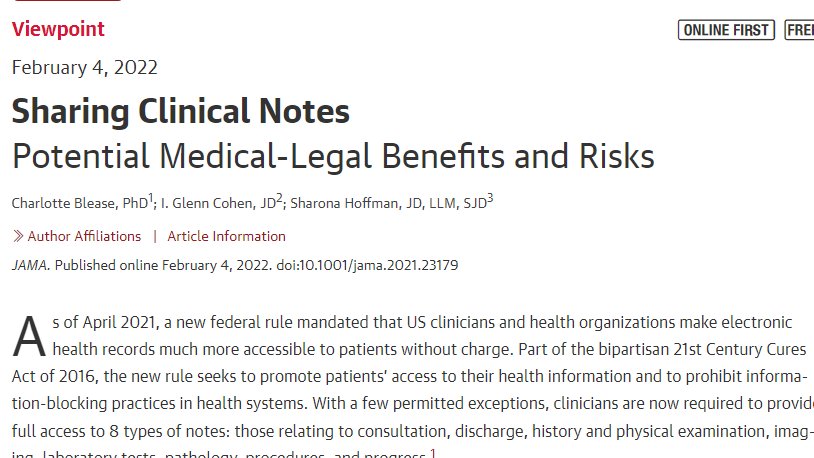JAMA has scheduled an article for publication in a future issue: "Sharing Clinical Notes Potential Medical-Legal Benefits and Risks”
As of April 2021, a new federal rule mandated that US clinicians and health organizations make electronic health records much more accessible to patients without charge.
Part of the bipartisan 21st Century Cures Act of 2016, the new rule seeks to promote patients’ access to their health information and to prohibit information-blocking practices in health systems.
With a few permitted exceptions, clinicians are now required to provide full access to 8 types of notes: those relating to (i) consultation, (ii) discharge, (iii) history and physical examination, (iv) imaging, (v) laboratory tests, (vi) pathology, (vii) procedures, and (viii) progress.
The new rule constitutes a substantial culture change for both patients and physicians. Yet, thus far, limited attention has been given to the legal implications of offering more complete access to patients’ health records. In particular, many physicians are rightly wondering what this might mean for medical malpractice claims against them.
Potential Medical-Legal Benefits of Sharing Clinical Notes Increased access to clinical notes could reduce malpractice claims by (1) reducing diagnostic delays, (2) reducing medical errors, and (3) improving patient-clinician relationships.
Misdiagnosis and delayed diagnosis are leading causes of malpractice claims, and failure to track and follow up on diagnostic information such as tests, results, or referrals is reportedly a major source of medical error.
In a survey of 6913 adult patients at a hospital (28% response rate) and 3672 parents at a children’s hospital (17% response rate), 53.8% of adult patients and 58.4% of parents reported that reading notes helped them to remember referral appointments, and 43.3% of adult patients and 44.8% of parents reported that access helped them remember scheduled tests.
More informed patients and caregivers could be more engaged in the diagnosis and treatment processes and thereby potentially help reduce the risk of delays and missed diagnoses.
Potential Medical-Legal Risks of Sharing Clinical Notes: Offering patients full access to their health information might also invite new legal concerns for clinicians. Litigation risks could increase if (1) data release causes harm, (2) physicians make changes that reduce the quality of documentation, (3) access strains patient-physician relationships, (4) physicians fail to correct errors that later cause harm, and (5) access increases physician burnout leading to errors.
Knowing that patients are reading what clinicians write in medical records may cause physicians to alter the contents of clinical documentation.
Contact the author: Charlotte Blease, PhD, Division of General Medicine, Beth Israel Deaconess Medical Center, 330 Brookline Ave, Boston, MA 02215 — [email protected].


